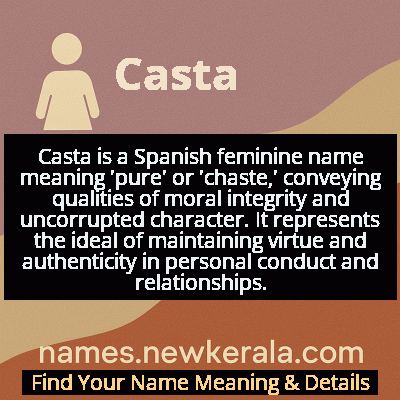Casta Name Meaning & Details
Origin, Popularity, Numerology Analysis & Name Meaning of Casta
Discover the origin, meaning, and cultural significance of the name CASTA. Delve into its historical roots and explore the lasting impact it has had on communities and traditions.
Name
Casta
Gender
Female
Origin
Spanish
Lucky Number
8
Meaning of the Name - Casta
Casta is a Spanish feminine name meaning 'pure' or 'chaste,' conveying qualities of moral integrity and uncorrupted character. It represents the ideal of maintaining virtue and authenticity in personal conduct and relationships.
Casta - Complete Numerology Analysis
Your Numerology Number
Based on Pythagorean Numerology System
Ruling Planet
Saturn
Positive Nature
Ambitious, efficient, realistic, and authoritative.
Negative Traits
Materialistic, stressed, confrontational, and can be overly ambitious.
Lucky Colours
Dark blue, black.
Lucky Days
Saturday.
Lucky Stones
Blue sapphire, amethyst.
Harmony Numbers
2, 4, 6.
Best Suited Professions
Business leaders, managers, financial services, law enforcement.
What People Like About You
Leadership, determination, organizational skills.
Famous People Named Casta
Casta Diva
Opera character
Iconic representation of purity in classical music
Castañeda lineage
Historical nobility
Prominent Spanish family name derived from casta purity concepts
Casta traditions
Cultural preservation
Maintenance of pure Spanish artistic and musical forms
Name Variations & International Equivalents
Click on blue names to explore their detailed meanings. Gray names with will be available soon.
Cultural & Historical Significance
Extended Personality Analysis
Women named Casta typically embody qualities of moral integrity, refined character, and inner purity that manifests as genuine kindness and strong principles. They are often perceived as having a natural dignity and grace that inspires trust and respect from others. Their purity of intention makes them reliable friends and ethical decision-makers who prioritize honesty and authenticity in all relationships. Castas tend to possess a quiet strength and conviction that allows them to maintain their values even in challenging circumstances. They often exhibit excellent judgment, clear thinking, and the ability to see through superficiality to the truth of people and situations. While sometimes perceived as reserved or traditional, their purity of heart gives them a radiant quality that attracts others seeking genuine connection and moral guidance. Their combination of strength and gentleness makes them natural peacemakers and trusted advisors.
Modern Usage & Popularity
In contemporary naming practices, Casta remains a distinctive choice that appeals to parents seeking names with deep cultural resonance and virtuous meanings. While not trending in popularity charts, it maintains a steady presence among families with strong Spanish heritage or those appreciating classical names with moral significance. Modern usage has successfully separated the name from its historical racial connotations, instead emphasizing positive qualities of authenticity, integrity, and spiritual purity. The name is particularly popular in regions with strong Catholic traditions where virtues of chastity and moral purity remain valued. Recent years have seen increased interest in the name among parents seeking unique yet meaningful names that aren't overly common, with the added appeal of easy pronunciation in multiple languages and its elegant, timeless quality.
Symbolic & Spiritual Meanings
Symbolically, Casta represents the ideal of purity in multiple dimensions - physical chastity, mental clarity, emotional transparency, and spiritual cleanliness. It embodies the concept of the uncorrupted self, the person who remains true to their essential nature and moral principles regardless of external influences. The name carries strong associations with light, clarity, and whiteness as metaphors for truth and authenticity. In psychological terms, it symbolizes integration and wholeness - the person who has harmonized their various aspects into a coherent, authentic whole. The name also represents cultural and artistic purity, suggesting preservation of traditional forms and resistance to dilution or corruption by outside influences. Metaphorically, Casta is like clear water, transparent glass, or unblemished snow - symbols of something that reveals its true nature without disguise or contamination.

